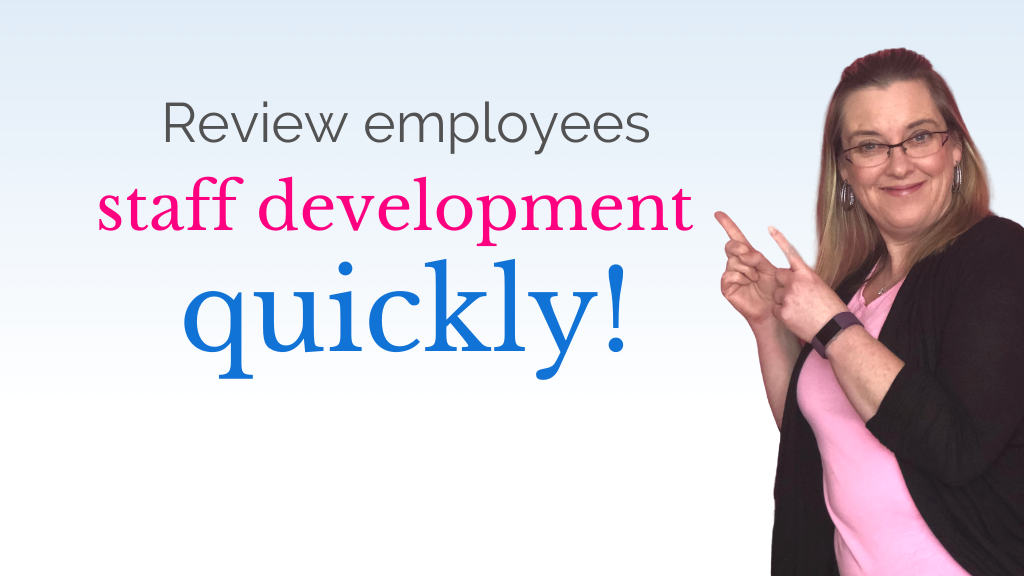|
Developing your employees isn’t always easy and can be time consuming! I’ve been sharing how to deal with complainers on your team. In my last blog, I encourage you to practice turning them back to their ability to take action rather than bellyache. Click here to review the 3 steps for dealing with complainers. In that video, I shared a bonus step in that article and want to highlight it today. After you've encouraged the complainer to take responsibility for impacting change, the bonus step was to ask:
Remember, it won't work! Before I jump into that bonus step, I want to remind you that the three steps and the bonus step won't make your employee stop complaining. To make a lasting difference in your employee's behaviour, you need to create a habit of responding in this way Once won't cut it. To make it work, do this: To create that habit, you first need to practice this new way of interacting with them. Your practice needs to be what is called deliberate practice. By deliberately practicing new ways of interacting that may feel weird and awkward, you are developing yourself outside of your comfort zone. If your habitual way of responding when someone complains is to sigh, remind them the same thing you told them 10x before and then answer the question for them, they won't change. They won't change, because you haven't changed either! Be patient with the process! As you learn to hold them accountable for their part of things they can impact, they will learn to take responsibility for changing their situation. But it all takes time. It also takes a lot of patience - yours! In time, your team members will become more responsible To grow and change the culture of your team from one where people tend to complain more than they take responsibility, you will need to work at improving your behaviour, individuals behaviours and your team vibe or culture. A powerful way to cultivate that type of change within your team is to create a growth mindset atmosphere. When everyone on your team is committed to self-improvement, growth and development, your team will grow and mature. This will help you avoid a toxic work culture Too many teams stay stuck in old ways that lead to toxic workplaces if you aren't careful. Ineffective patterns of communication, unproductive meeting styles and inadequate use of resources leave people frustrated. Discontent people lead to complaining, gossiping and will have your good people looking for a new job fast! As the leader, you set the tone in your workplace To make sure that doesn't happen to you, install a growth mindset culture. That's one where everyone is committed to learning, growing and developing themselves. You are the one to set the tone for that type of workplace culture. Build in accountability This brings me back to the bonus step when you are dealing with complainers. Not only do you need to ask them what you can do to hold them accountable, but you also need to hold yourself accountable.
Here is the thing to put on your AGENDA I'm suggesting using your team meeting agenda to hold everyone, including yourself accountable! Yes, the agenda. The title of this post was "Quick, put this on your agenda." That is because I am encouraging you to put individual growth and development on the agendas of your staff meetings. This will take time. Yes, I am repeating myself! I also want to caution you that this is a long-range strategy. One that will take a bit of time to implement and will morph as you go. But that is entirely the point. Commit to ongoing growth for you and your team Leadership is an ongoing growth journey. Commit now to ongoing personal and professional development, deliberate practice and patience. As you do all of that, you will develop your growth mindset and strengthen your leadership capacity. Back to the team meeting agenda strategy: Get rid of the things on your agenda items that could be an email. When you do, you will make time for cultivating a growth mindset on your team. Here's how to do it Have everyone give a 1-2 min report out on what they are learning, how they are growing, or what skill they are developing in themselves.
An example: You could share these examples when you introduce the concept:
How does all of this help you practice? Remember, I said this exercise would morph. Start gently Initially, you may keep your growth updates to safe topics such as you are attending a conference. Then step outside of your comfort zone! Over time, though, you may become braver. You then may courageously note what you are working on that is more personal development related. When you do this, you'll set the stage for others as your team adopts the growth mindset and builds trust. For example, in time, you might say:
It's by using your team's agenda to do updates on personal and professional growth that you'll hold yourself accountable. Ahhhh...making sense now? In a nutshell: Leading in a new way takes practice. Practice takes time. Practicing over time takes patience. But it's all sooooo worth it when you have the impact you desire, your team grows, and you all do the work to change that part of the world, that you were meant to change! One final reminder: Ongoing personal and professional development is your path to success in both leadership and life! #growthmindset To hear more about putting this staff development strategy into action, watch this video.
0 Comments
Your comment will be posted after it is approved.
Leave a Reply. |

Available on Amazon
Archives
May 2024
|
|
Leadership TRAINING for Nonprofit Leaders
Become a confident and competent nonprofit Leader: Join The Training Library membership Executive and Leadership COACHING Leadership Coaching for Nonprofit Executives, Leaders and ManagerCoaching |
PODCAST for Nonprofit Leaders
The Surviving to Thriving podcast: Strategies, systems and support to lead your nonprofit with confidence FREE RESOURCES to Grow your Leadership Skills Free Leadership Training Resources, Worksheets and Templates |
Become a CONFIDENT LEADER
|




 RSS Feed
RSS Feed
